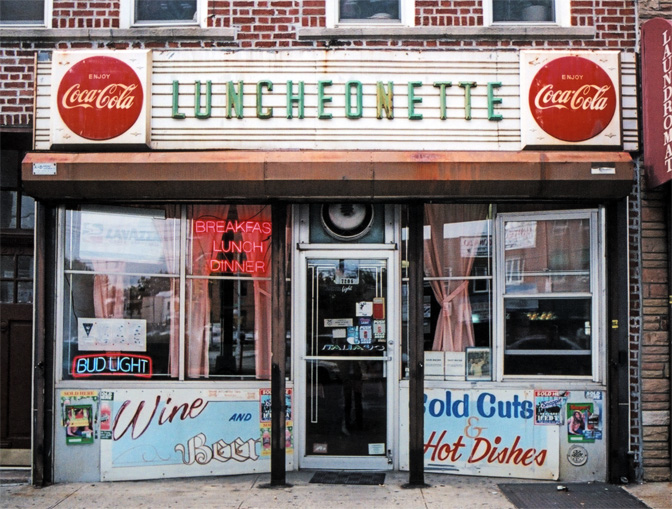The Friday lunchtime special at the small diner (known as “The Luncheonette”) in my neighborhood was called The Junior. It consisted of a smaller than usual hamburger, a handful of crinkle-cut French fries, a small Coca-Cola (in a real glass), and a dill pickle spear (my favorite part). All this could be had for fifty cents, and it was what I ate every Friday during the fourth grade.

www.jamesandkarlamurray.com
I could often see my mom standing in front of The Luncheonette as I walked the last leg of my two-block hike from P.S. 135. Mom was a manicurist in the beauty salon a few doors down and to make sure we were on schedule, she would get there early and preorder my lunch. We always sat at the counter--on the round red leatherette stools that swiveled when you tried to hop up on them. She would never order her own meal--she didn’t have that much time to spend because Friday was one of the busiest days at the salon. As I ate she would often sneak a fry out of my plate. I liked it best when she kept me company. We would chat about school as I took small bites and tried to extend my lunchtime break for as long as I could. Every so often she would have to get back to work before I was done, and I was then left to finish and head out on my own.
From my spot at the counter, I could observe a flurry of activity--everyone there, workers and diners alike, was in a rush. I would often see one or two other elementary school students eating, but mostly the other stools and the chairs near the Formica-topped tables were being used by adults who were on their own lunch hours or just taking a midday break. The air at that hour hung thick, a mixture of the scent of frying meat from the grill and sugar from the few donuts (probably left over from breakfast) sitting uncovered on an oil-stained doily on the chrome cake stand. Every once in a while a whirring could be heard from the malted machine, and then the click of a glass hitting the counter right before the thick, slow-to-pour liquid filled it to the brim. I loved sitting there, listening to the cacophony of sizzles and clanks intermingled with the snippets of conversation I could pick up.
My meal was eaten pretty rapidly, but I saved the last few drops of the syrupy sweet, dark cola for last. We were not a soda family, and this drink was truly a treat. The entire meal, so simply American, was quite different from the same meal we ate at home. My mom’s French fries were hand cut--they didn’t come frozen in a bag. They were deep-fried in clear, clean oil, and left to drain on a sheet of brown butcher paper that was stretched across a big bowl. Sprinkled with a shower of kosher salt, they were brown and crisp on the outside and creamy on the inside. And her hamburgers came from meat that was specially ground to order. They were nothing like the thin brown patties at The Luncheonette. If asked whether I preferred the burger and fries from home or The Junior, I know The Junior would have won hands down. It had nothing to do with the food and how it was prepared. It was the experience--the half hour with my mom sitting next to me in her black uniform with the butterfly applique on the shoulder. A weekly slice of Americana that I wouldn’t trade for any other meal.
